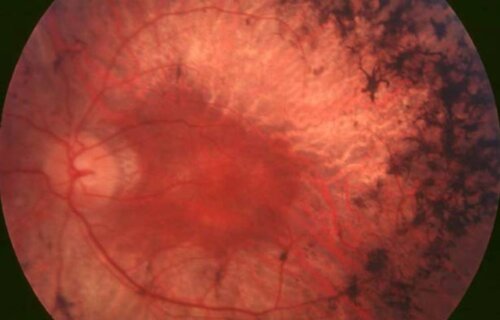LONDON — Bacteria in a person’s gut may be responsible for the blindness that certain inherited eye diseases cause, according to researchers in the United Kingdom. However, the research also suggests that these eye conditions may be treatable with antimicrobials.
This international research project uncovered that in eyes experiencing vision loss due to a particular genetic mutation, one that causes eye diseases linked to blindness, gut bacteria was actually present within the damaged areas of the eye.
Study authors from University College London, in collaboration with a team of Chinese scientists, add that this work shows the genetic mutation may work to relax or turn down the body’s natural defenses, allowing the harmful bacteria to make its way all the way up the eyes and cause blindness.
The human gut contains trillions of bacteria, with many being essential to healthy digestion. However, certain microbes can also be potentially harmful.
Researchers originally set out to analyze the influence of the Crumbs homolog 1 (CBR1) gene, known to show expression within the retina (the thin layer of cells at the back of the eye). That gene is critical for building the blood-retina barrier that regulates what flows in and out of the eye.
The CRB1 gene is also associated with inherited eye disease. In most cases Leber congenital amaurosis (LCA) and retinitis pigmentosa (RP); the gene is the cause of 10 percent of LCA cases and seven percent of RP cases on a worldwide scale.
Through experiments on mice, researchers discovered that the CRB1 gene is vital to controlling the integrity of the lower gastrointestinal tract, marking the first time ever such an observation has been recorded. In the lower gastrointestinal tract, it fights pathogens and harmful bacteria by regulating everything passing between the contents of the gut and the rest of the body.

Study authors note that when the gene features a particular mutation that dampens its expression, reducing its effect, those barriers in the retina and gut can undergo a breach, subsequently leading bacteria in the gut to move through the body into the eye. This can produce lesions in the retina that may result in loss of vision.
Perhaps most importantly, the study also notes that treating the bacteria with antimicrobials like antibiotics resulted in the prevention of vision loss among a group of mice – although such treatments did not rebuild the affected cell barriers in the eye.
The onset of inherited eye disease varies widely from person to person. One individual may develop symptoms very early in childhood while others won’t notice an issue until adulthood. Regardless of when it occurs, deterioration is irreversible and has lifelong implications. Up until now, the development of relevant treatments has largely focused on gene therapies.
This study indicates that using antimicrobials may help hinder deterioration in CRB1-associated inherited eye diseases. Future studies aim to assess if this applies in humans as well.
“We found an unexpected link between the gut and the eye, which might be the cause of blindness in some patients,” says co-lead author Professor Richard Lee (UCL Institute of Ophthalmology and Moorfields Eye Hospital NHS Foundation Trust) in a media release. “Our findings could have huge implications for transforming treatment for CRB1-associated eye diseases. We hope to continue this research in clinical studies to confirm if this mechanism is indeed the cause of blindness in people, and whether treatments targeting bacteria could prevent blindness.”
“Additionally, as we have revealed an entirely novel mechanism linking retinal degeneration to the gut, our findings may have implications for a broader spectrum of eye conditions, which we hope to continue to explore with further studies.”
The study is published in the journal Cell.
